基于 TRIM21 的分子胶和 PROTAC 降解剂对多聚蛋白的选择性降解
IF 45.5
1区 生物学
Q1 BIOCHEMISTRY & MOLECULAR BIOLOGY
引用次数: 0
摘要
靶向蛋白质降解(TPD)利用分子粘合剂或蛋白水解靶向嵌合体(PROTAC),通过促进致病蛋白质与 E3 泛素连接酶的相互作用来消除致病蛋白质。目前的 TPD 方法受限于对少数组成型活性 E3 泛素连接酶的依赖。在这里,我们报告了抗精神病药物乙酰丙嗪的代谢产物 (S)-ACE-OH 可作为分子胶水诱导 E3 泛素连接酶 TRIM21 与核蛋白 NUP98 之间的相互作用,从而导致核孔蛋白降解和核胞质贩运中断。将乙酰丙嗪功能化到 PROTACs 中可以选择性地降解多聚蛋白,如生物分子凝聚体中的多聚蛋白,而不降解单体蛋白。这种选择性与底物诱导的集群对 TRIM21 激活的要求是一致的。由于异常蛋白质组装会导致自身免疫、神经变性和癌症等疾病,我们的研究结果凸显了基于 TRIM21 的多聚体选择性降解剂作为解决这些疾病直接病因的一种策略的潜力。本文章由计算机程序翻译,如有差异,请以英文原文为准。

Selective degradation of multimeric proteins by TRIM21-based molecular glue and PROTAC degraders
Targeted protein degradation (TPD) utilizes molecular glues or proteolysis-targeting chimeras (PROTACs) to eliminate disease-causing proteins by promoting their interaction with E3 ubiquitin ligases. Current TPD approaches are limited by reliance on a small number of constitutively active E3 ubiquitin ligases. Here, we report that (S)-ACE-OH, a metabolite of the antipsychotic drug acepromazine, acts as a molecular glue to induce an interaction between the E3 ubiquitin ligase TRIM21 and the nucleoporin NUP98, leading to the degradation of nuclear pore proteins and disruption of nucleocytoplasmic trafficking. Functionalization of acepromazine into PROTACs enabled selective degradation of multimeric proteins, such as those within biomolecular condensates, while sparing monomeric proteins. This selectivity is consistent with the requirement of substrate-induced clustering for TRIM21 activation. As aberrant protein assemblies cause diseases such as autoimmunity, neurodegeneration, and cancer, our findings highlight the potential of TRIM21-based multimer-selective degraders as a strategy to tackle the direct causes of these diseases.
求助全文
通过发布文献求助,成功后即可免费获取论文全文。
去求助
来源期刊

Cell
生物-生化与分子生物学
CiteScore
110.00
自引率
0.80%
发文量
396
审稿时长
2 months
期刊介绍:
Cells is an international, peer-reviewed, open access journal that focuses on cell biology, molecular biology, and biophysics. It is affiliated with several societies, including the Spanish Society for Biochemistry and Molecular Biology (SEBBM), Nordic Autophagy Society (NAS), Spanish Society of Hematology and Hemotherapy (SEHH), and Society for Regenerative Medicine (Russian Federation) (RPO).
The journal publishes research findings of significant importance in various areas of experimental biology, such as cell biology, molecular biology, neuroscience, immunology, virology, microbiology, cancer, human genetics, systems biology, signaling, and disease mechanisms and therapeutics. The primary criterion for considering papers is whether the results contribute to significant conceptual advances or raise thought-provoking questions and hypotheses related to interesting and important biological inquiries.
In addition to primary research articles presented in four formats, Cells also features review and opinion articles in its "leading edge" section, discussing recent research advancements and topics of interest to its wide readership.
 求助内容:
求助内容: 应助结果提醒方式:
应助结果提醒方式:


